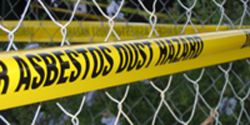

Thurrock Council has been fined after admitting to failures in how it managed asbestos across its schools.
Basildon Crown Court heard on 1 March that despite being made aware of asbestos concerns in a boiler room at Stifford Clays Junior School, no action was taken.
A specialist contractor tasked with carrying out an asbestos survey by the council in 2004 said that dust and debris found in the boiler room containing asbestos fibres should be removed immediately under licensed conditions.
However, an HSE inspection in April 2010 – as part of a national initiative to ensure that local authorities understand their duties in managing asbestos across their school estate – found that nothing had been done.
This was despite school staff and contractors alike regularly entering the boiler room in the intervening six-year period.
HSE served a Prohibition Notice in April 2010 barring entry to the boiler house until it was made safe. Thurrock Council was also served with two Improvement Notices regarding the management of asbestos in its schools elsewhere in the county.
Thurrock Council, Essex was fined a total of £35,000 and ordered to pay £15,326 in costs after pleading guilty to a Regulation 10 breach of the Control of Asbestos Regulations (CAR 2006) and a breach of the Management of Health and Safety at Work Regulations 1999 – both in relation to failings across the school estate.
The council also admitted a Regulation 11 breach of the Control of Asbestos Regulations (CAR 2006) in relation to the specific incident at Stifford Clays Junior School.
After the hearing, HSE inspector Samantha Thomson said: "This was a clear example of a local authority failing to manage asbestos across its schools for a number of years.
"At Stifford Clays Junior School, the caretaker regularly worked in the boiler room with dust and debris over a period of six years. She will have been exposed to asbestos fibres and now faces an anxious wait to see if it results in any long-term health issues.
"This was easily preventable. Thurrock Council was informed of the potential for exposure in 2004, yet failed to act on the knowledge until HSE's involvement six years later."
If you'd like to keep up-to-date with the latest developments in the heating and plumbing industry, why not subscribe to our weekly newsletters? Just click the button below and you can ensure all the latest industry news and new product information lands in your inbox every week.